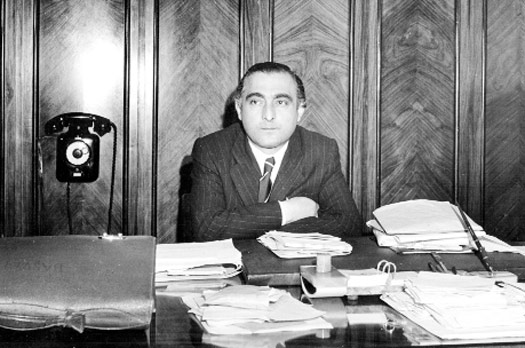Writer, publicist, a statesman of Türkiye Samet Aghaoglu
 Samed Ahmed Bey Aghaoglu was born on April 23, 1909, in Baku. Only a few months later, his family relocated to Turkey. He received his early education at Fevziye School in Istanbul. Following his family's move to Ankara, which had been declared Turkey's new capital, he attended a high school there. Despite his passion for literature and the arts, at his father's insistence, he enrolled in the Law Faculty at Ankara University (1926-1931), where he successfully completed his higher education. Afterwards, he pursued a master's degree at the University of Strasbourg but did not finish his studies. It was during this period that he began to explore his creative talents, experimenting with writing for the first time. He later recounted his experiences in France in his book “Memories of Strasbourg".
Samed Ahmed Bey Aghaoglu was born on April 23, 1909, in Baku. Only a few months later, his family relocated to Turkey. He received his early education at Fevziye School in Istanbul. Following his family's move to Ankara, which had been declared Turkey's new capital, he attended a high school there. Despite his passion for literature and the arts, at his father's insistence, he enrolled in the Law Faculty at Ankara University (1926-1931), where he successfully completed his higher education. Afterwards, he pursued a master's degree at the University of Strasbourg but did not finish his studies. It was during this period that he began to explore his creative talents, experimenting with writing for the first time. He later recounted his experiences in France in his book “Memories of Strasbourg".
Samed Ahmed Bey Aghaoglu was involved in literary writing until 1939 but did not publish anything. In the initial stage of his literary career, he was primarily a publicist and researcher. During this time, he wrote "Minor Problems of Art in Turkey" (1939), "The History of Labor Law in Turkey" (co-authored with Salahaddin Hudayoglu, 1939), "Commercial Chambers, Trade Chambers, and Commodity Exchanges in the Economic Organization of Turkey" (1943), "Strength-National Spirit" (1944), "Children of Criminals in Turkey" (co-authored with his sister Tezer Tashkiran, 1947), "Political Differences Between Two Parties" (1947), and other pamphlets and books. These works, political memoirs stemming from thorough research, not only demonstrate Samed Aghaoglu's profound knowledge in economics and law but also provide a foundation for scientific-historical analysis.
S. Aghaoglu joined the Democratic Party in July 1946. By becoming part of its leadership, he positioned himself alongside the founders of the Democratic Party. This political party's ascent to power enabled him to occupy prominent positions: he served as the Deputy Prime Minister (1950-1952), Minister of Industry (1952-1954), and Minister of Trade (1954-1958) in the government cabinet led by Adnan Menderes. He was elected three times as a representative to the Grand National Assembly of Turkey from the Manisa province in 1950, 1954, and 1957.
As a result of the military coup on May 27, 1960, Adnan Menderes' government was overthrown. Among the arrested was Samed Aghaoglu. Four months later, on September 14, the court condemned Prime Minister Adnan Menderes, Foreign Minister Fatin Rushtu Zorlu, and Finance Minister Hasan Polatkan to the death penalty by hanging. Samed Aghaoglu received a life sentence. He spent years in incarceration in notable Turkish prisons such as Yassıada, Imrali, and Kayseri. Yet, even during these years of hardship, he remained connected to his ideas and continued his creative work. He was released in 1964 under a special amnesty.
On August 13, 1966, S. Aghaoglu and his wife visited the USSR. Over two months, they explored various regions of the Soviet Union, including Azerbaijan. S. Aghaoglu reunited with his relatives in Baku and Shusha. His book "The Soviet Russian Empire," which detailed his impressions of the trip, was published in 1967.
After his release from prison, Samed Bey dedicated himself to literary creation, writing memoirs. Samed Aghaoglu, with his literary talent and innate observational skill, pioneered the synthesis of memoir literature elements with art in modern Turkish prose, creating a series of original, memorable prose images. His works through the years, such as "Memories of My Father" (1940), "My Father's Friends" (1957), "Familiar Faces" (1965), "My Friend Menderes" (1967), "Island in Marble" (1972), "The First Stage" (1978), and "Life is an Adventure" (1981), are considered seminal works in the memoir genre in contemporary Turkey. These writings depict the political, spiritual, literary, and intellectual landscapes of an entire era against the backdrop of the lives and endeavors of individual personalities. His memoirs, written in a distinctive style, illuminate the history of Turkey’s political, spiritual, moral, and intellectual evolution over the last hundred years with fairness and objectivity.
Samed Ahmed Bey Oglu Aghaoglu died on August 6, 1982, in Turkey.
Recommended literature:
- Ağaoğlu, Səməd Əhməd bəy oğlu. Atamın dostları : [memuar] / S. Ə. Ağaoğlu ; tərc., şərhlərin müəl. V. M. Quliyev ; red. G. Nəsib ; Azərbaycan Respublikasının Nazirlər Kabineti yanında Tərcümə Mərkəzi. - Bakı : Azərbaycan Tərcümə Mərkəzi, 2016. - 376 s.
- Ağayev, Səməd Əhməd oğlu. Hekayələr, memuarlar / S. Ə. Ağayev ; tərt. V. M. Quliyev ; red. A. H. Rüstəmli. - Bakı : Ozan, 2008. - 352 s.
- Əhməd, Dilqəm. Mühacirlərin dönüşü : yeni fotolar və sənədlər / D. Əhməd ; red. Ə. Ş. Tahirzadə. I cild. - II nəşri. - Bakı : TEAS Press, 2017. - 140 s.